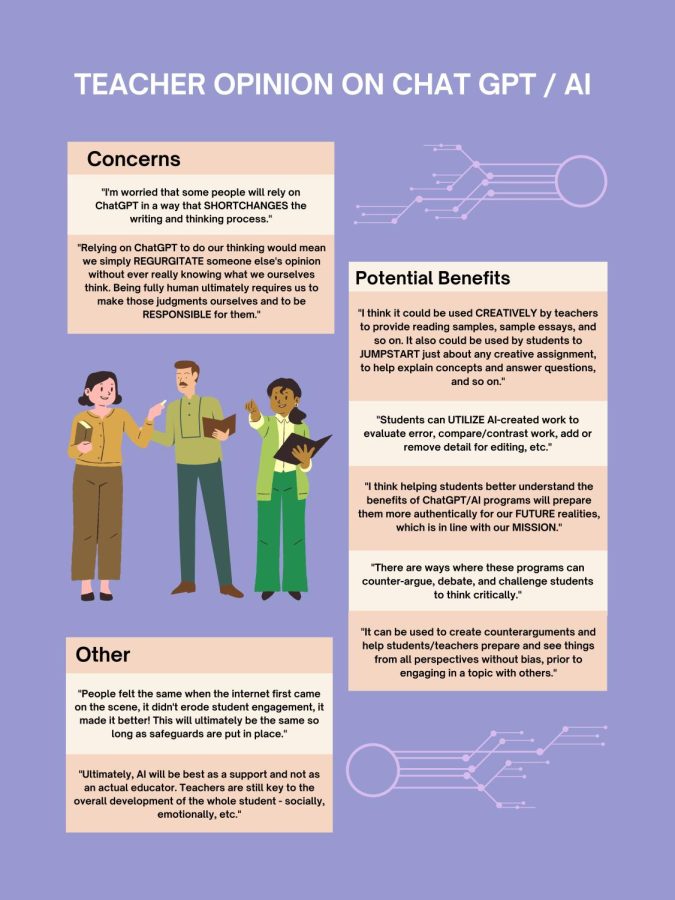Opinion: Harnessing Chat GPT in Education
May 11, 2023
Is the infamous ChatGPT good or bad? Well, it’s a bit more complex than good or bad. All new technology presents pros and cons. There is no avoiding new technology as it is constantly becoming more advanced, especially AI (Artificial Intelligence).
Schools implement policies that are well-meaning but ineffective. Rather than focusing on how to abolish ChatGPT from students’ lives, the focus should be on learning how to work with ChatGPT and teaching students how to use it appropriately to enhance critical thinking skills, which are important components of education.
ChatGPT can answer almost any type of question covering any subject in school. This powerful tool can be very easily abused and used inappropriately; however, it can also be used to enhance student learning in various ways.
If used within the guidelines of academic honesty ChatGPT can provide personalized learning to students. This personalized learning comes in many forms. For example, for questions with one solution, such as, math and science problems ChatGPT provides both the steps to the answer and the answer. Often students use technology like ChatGPT because they do not understand how to solve the problem. ChatGPT teaches students through an example how to solve problems that they do not understand. For example, if a student put in a PEMDAS math equation, ChatGPT would break down what is required in each step-in order to achieve the final answer, showing students the way to solve the problem, and not just the answer.
For questions with more than one answer, such as English and history questions, ChatGPT instead provides anywhere from a paragraph to an essay. On the one hand, there is a temptation for students to simply plagiarize, on the other hand, these answers can also provide a scaffold from which to learn. In its current state at least, the technology often gets syntax and facts wrong so plagiarism would not get a student very far. Additionally, ChatGPT generates information from millions of sources; therefore, it does not provide citations that are required in student essays, and the student further would have zero idea where the information in the ChatGPT generated essay is from. Used correctly, a ChatGPT produced essay can explain the book or concept to the student. Then the student can get a tighter grasp of the key themes of the book or concept to help them enhance their own response. When a student is conflicted about an essay prompt, and the teacher does not provide a previous student example, ChatGPT provides a general understanding of the essay topic, giving students a sample essay to generate ideas for themselves.
The reality is students will use these tools anyway. Rather than focusing on how to abolish ChatGPT teachers should work with students to use new technology appropriately. Learning how to work with technology appropriately will enable students to use technology to learn, within the guardrails of academic honesty.
Right now, Prep teachers use Turninit.com to detect plagiarism. This is a stopgap solution that has several limitations especially as ChatGPT’s technology progresses. Instead of this approach, it would be better to focus on more critical thinking skills that ChatGPT cannot yet fully accomplish. Rather than focusing on policing the use of ChatGPT, schools should be working towards incorporating ChatGPT into students’ work. This will promote students to work with advancing technology within the guidelines of academic honesty.
ChatGPT can be used in many ways without plagiarizing. This includes asking ChatGPT to provide suggestions for grammar, vocabulary, and sentence structure. As well as giving feedback on essays and generating ideas. Furthermore, ChatGPT can be used to help students study from generating written prompts to practice for essays to debating a subject with a student so the student can strengthen their argument. Teachers should let students use ChatGPT for analytical work, the work that programs are good at, so that students can instead focus on connecting topics to their own lives as well as other subjects that require the critical thinking skills of a human.




